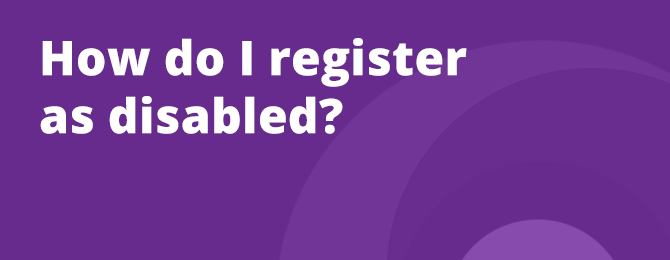How do I register as disabled?

As there is no longer a national register of disabled people, technically you don't need to register as disabled.
Blue Badge parking permits
To apply for a Blue Badge parking permit, you need to contact the council.
The Blue Badge Scheme is for people with severe mobility problems. Blue Badge holders are able to park close to where they need to go. The scheme is managed by local authorities who deal with applications and issue Blue Badges.
GOV.UK has more details about the Blue Badge scheme, including information about applying for a Blue Badge.
Registering as blind or partially sighted
Visit your GP or optician if you're having problems with your sight. They can refer you to a consultant ophthalmologist (eye specialist) who can assess whether you qualify to register as sight-impaired (partially sighted) or severely sight-impaired (blind).
If you qualify, the ophthalmologist will complete a Certificate of Vision Impairment. They will send it to your GP and your local social services department, who will contact you to find out what help and advice you need.
If you're registered with your local authority as blind or partially sighted, you may be entitled to travel concessions, such as a Disabled Person Railcard. If you're registered as blind, you may also be entitled to other concessions, such as free public transport and a discount on your TV licence.
The Royal National Institute of Blind People (RNIB) provides further information about registering your sight loss.
Registering as deaf
Visit your GP if you're having hearing problems. They can refer you to a hearing specialist.
Action on Hearing Loss has information about benefits and services for people with hearing loss.
Disability benefits
Not everyone with a disability can claim disability benefits. However, if your condition affects your daily living activities, you should apply.
The Disability Living Allowance (DLA) for working-age adults with a disability has now been replaced by a new benefit: the Personal Independence Payment (PIP). As with DLA, PIP is designed to help you meet some of the extra costs you may have due to a long-term health condition or disability.
You can only make a new claim for DLA if you're claiming for a child under 16. This is known as DLA for children.
Attendance Allowance is a tax-free benefit for people aged 65 or over who need help with personal care because they're physically or mentally disabled.
See GOV.UK for more information about DLA and Attendance Allowance, plus what to do if you become disabled.
You might also like
- Am I entitled to a free NHS eye test?
- How do I get a hearing aid through the NHS?
- Visual impairment
- Hearing impairment (deafness)
- Living with disability
- NHS information and services
- How to get adult social care support
- Caring for other people
Continue reading
- How do I register as a disabled
- Financial help if you're disabled
- Council tax discounts for disabled residents
- Help for parents carers of disabled children
- How to care for a disabled child
Is the information correct?
Let us know if the information on this page needs updating.
Want to create a page on the Plymouth Online Directory? Register for free and add a page; it only takes a few minutes.




